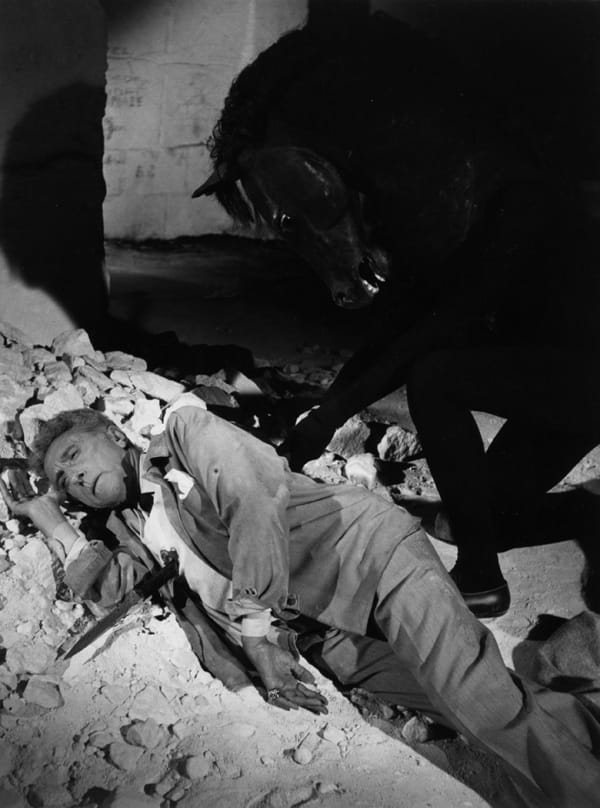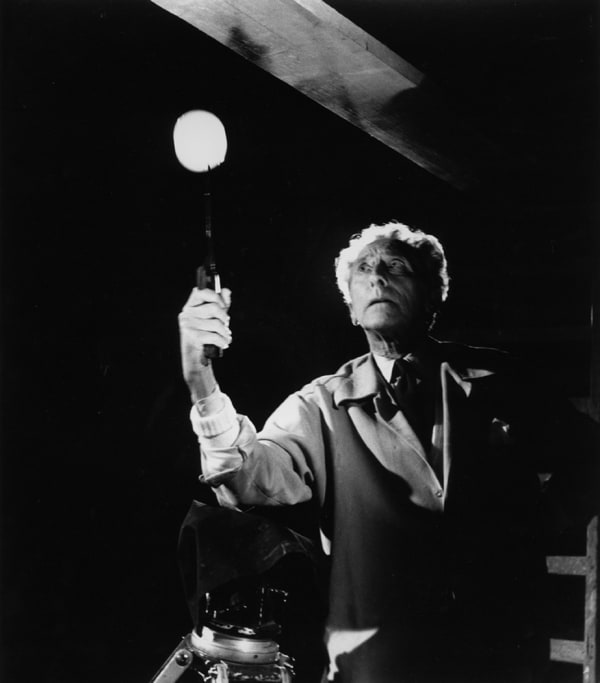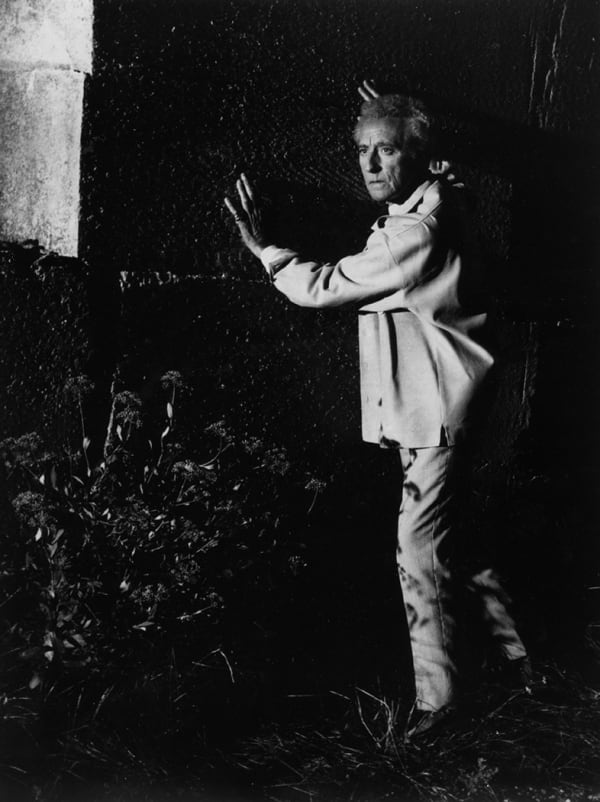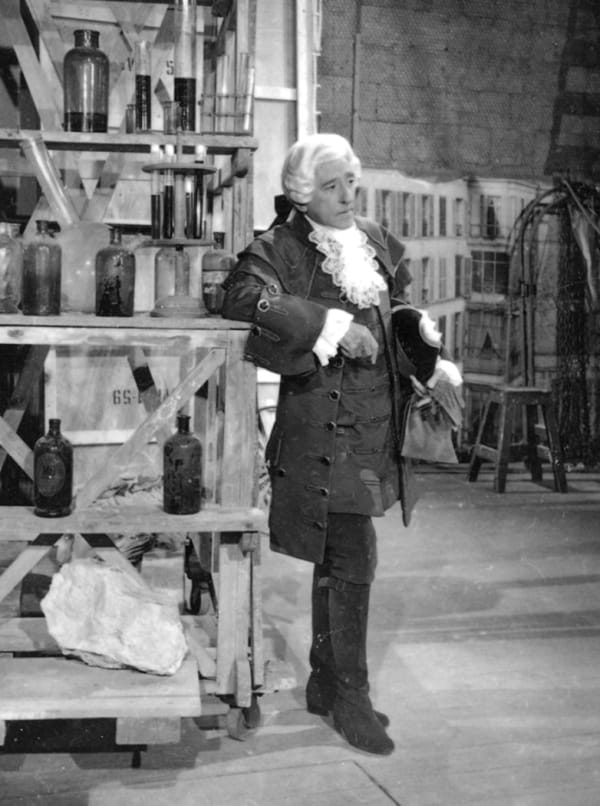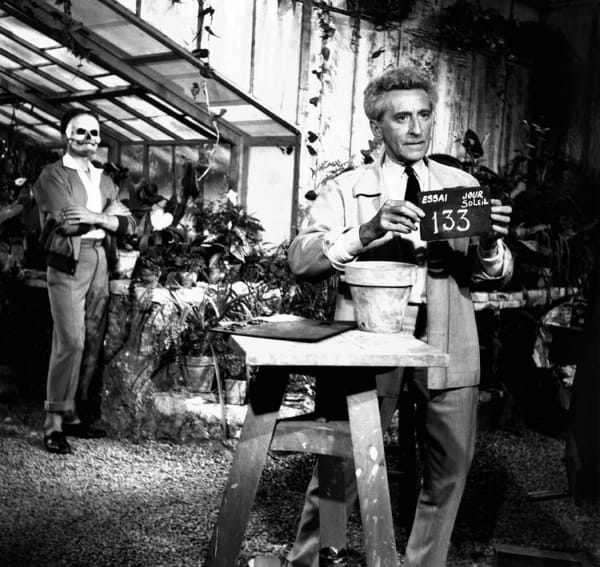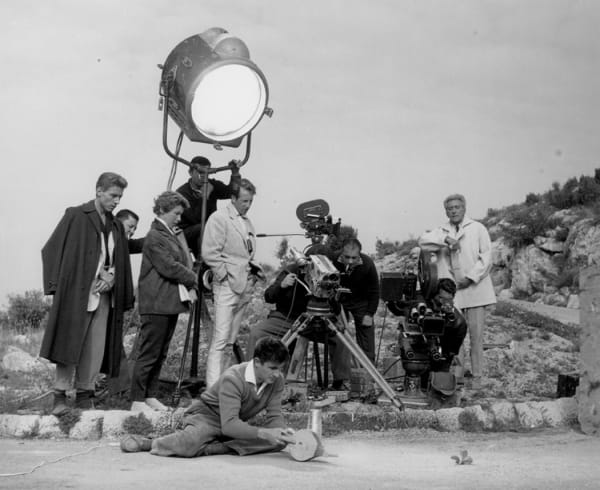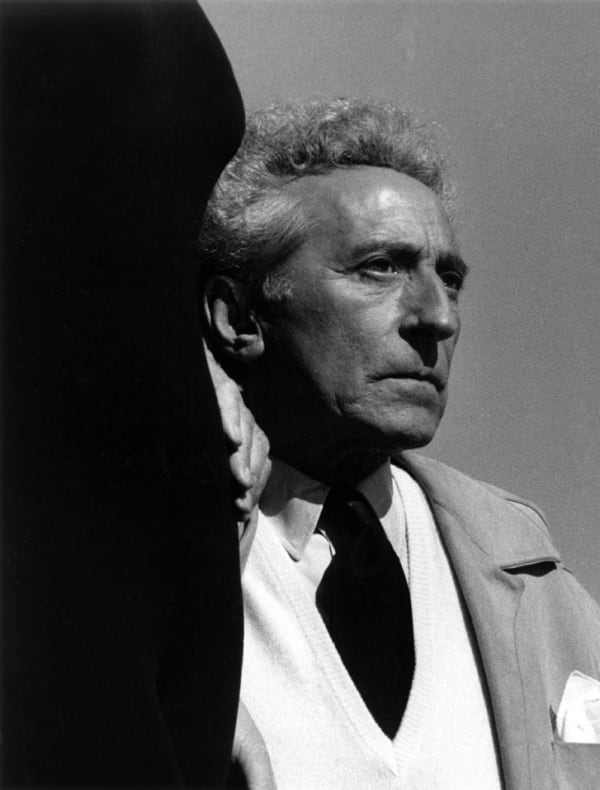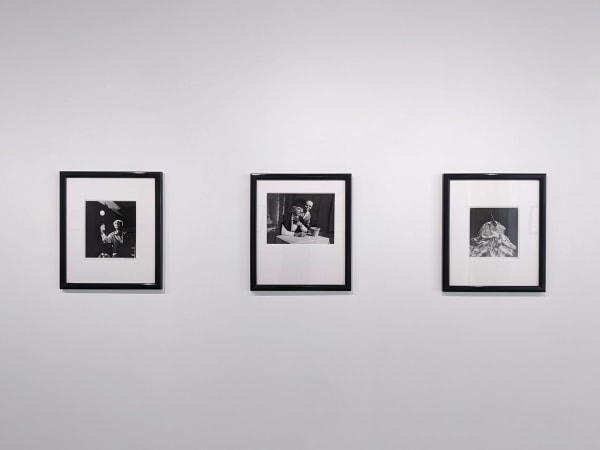-
 Lucien Clergue, Jean Cocteau on the set of Testament of Orpheus, Les Baux-de-Provence, 1959
Lucien Clergue, Jean Cocteau on the set of Testament of Orpheus, Les Baux-de-Provence, 1959 -
 Lucien Clergue, Jean Cocteau in the Testament of Orpheus, Les Baux-de-Provence, 1959
Lucien Clergue, Jean Cocteau in the Testament of Orpheus, Les Baux-de-Provence, 1959 -
 Lucien Clergue, Jean Cocteau as The Poet and the Sphinx, Testament of Orpheus, Val d’Enfer, Les Baux-de-Provence, 1959
Lucien Clergue, Jean Cocteau as The Poet and the Sphinx, Testament of Orpheus, Val d’Enfer, Les Baux-de-Provence, 1959 -
 Lucien Clergue, Jean Cocteau in the Testament of Orpheus, Les Baux-de-Provence, 1959
Lucien Clergue, Jean Cocteau in the Testament of Orpheus, Les Baux-de-Provence, 1959
-
 Lucien Clergue, Jean Cocteau bursts the bubble, Testament of Orpheus, Studios de la Victorine, Nice, 1959
Lucien Clergue, Jean Cocteau bursts the bubble, Testament of Orpheus, Studios de la Victorine, Nice, 1959 -
 Lucien Clergue, Jean Cocteau and the horse-men, Testament of Orpheus, Les Baux-de-Provence, 1959
Lucien Clergue, Jean Cocteau and the horse-men, Testament of Orpheus, Les Baux-de-Provence, 1959 -
 Lucien Clergue, Luis Miguel Dominguín, Jacqueline Picasso, Pablo Picasso, Jean Cocteau, Serge Lifar and Lucia Bosé, Testament of Orpheus, Les Baux-de-Provence, 1959
Lucien Clergue, Luis Miguel Dominguín, Jacqueline Picasso, Pablo Picasso, Jean Cocteau, Serge Lifar and Lucia Bosé, Testament of Orpheus, Les Baux-de-Provence, 1959 -
 Lucien Clergue, Jean Cocteau as The Poet and the Sphinx, Testament of Orpheus, Les Baux-de-Provence, 1959
Lucien Clergue, Jean Cocteau as The Poet and the Sphinx, Testament of Orpheus, Les Baux-de-Provence, 1959
-
 Lucien Clergue, Jean Cocteau as the Poet discovers the gypsy camp, Quarries at Les Baux-de-Provence, 1959
Lucien Clergue, Jean Cocteau as the Poet discovers the gypsy camp, Quarries at Les Baux-de-Provence, 1959 -
 Lucien Clergue, Jean Cocteau in Louis XV costume, Testament of Orpheus, Studios de la Victorine, Nice, 1959
Lucien Clergue, Jean Cocteau in Louis XV costume, Testament of Orpheus, Studios de la Victorine, Nice, 1959 -
 Lucien Clergue, Henri Crémieux as the Professor and Jean Cocteau as the Poet in Testament of Orpheus, Studios de la Victorire, Nice, 1959
Lucien Clergue, Henri Crémieux as the Professor and Jean Cocteau as the Poet in Testament of Orpheus, Studios de la Victorire, Nice, 1959 -
 Lucien Clergue, Jean Cocteau on the camera, Studios de La Victorine, Nice, 1959
Lucien Clergue, Jean Cocteau on the camera, Studios de La Victorine, Nice, 1959
-
 Lucien Clergue, Jean Cocteau in Louis XV costume on the camera, Testament of Orpheus, Studios de la Victorine, Nice, 1959
Lucien Clergue, Jean Cocteau in Louis XV costume on the camera, Testament of Orpheus, Studios de la Victorine, Nice, 1959 -
 Lucien Clergue, Jean Cocteau and the hibiscus flower, Testament of Orpheus, Studios de la Victorine, Nice, 1959
Lucien Clergue, Jean Cocteau and the hibiscus flower, Testament of Orpheus, Studios de la Victorine, Nice, 1959 -
 Lucien Clergue, Jean Cocteau as the Poet and Edouard Dermithe as Cegestius, Testament of Orpheus, Studios de la Victorine, Nice, 1959
Lucien Clergue, Jean Cocteau as the Poet and Edouard Dermithe as Cegestius, Testament of Orpheus, Studios de la Victorine, Nice, 1959 -
 Lucien Clergue, Testament of Orpheus, the final scene with Edouard Dermithe, Claude Pinoteau and Jean Cocteau, Route de l’Artubie, 1959
Lucien Clergue, Testament of Orpheus, the final scene with Edouard Dermithe, Claude Pinoteau and Jean Cocteau, Route de l’Artubie, 1959
-
 Lucien Clergue, Jean Cocteau in the chapel Sainte Blaise, Milly-la-Forêt, photo 1959 | printed 1988
Lucien Clergue, Jean Cocteau in the chapel Sainte Blaise, Milly-la-Forêt, photo 1959 | printed 1988 -
 Lucien Clergue, Oedipus with gouged out eyes, Testament of Orpheus, Les Baux-de-Provence, 1959
Lucien Clergue, Oedipus with gouged out eyes, Testament of Orpheus, Les Baux-de-Provence, 1959 -
 Lucien Clergue, Jean Cocteau, port of Villefranche-sur-Mer, 1959
Lucien Clergue, Jean Cocteau, port of Villefranche-sur-Mer, 1959 -
 Lucien Clergue, Jean Cocteau as the Poet and the Sphinx, Testament of Orpheus, Val d’Enfer, Les Baux-de-Provence, 1959
Lucien Clergue, Jean Cocteau as the Poet and the Sphinx, Testament of Orpheus, Val d’Enfer, Les Baux-de-Provence, 1959
-
 Lucien Clergue, Luis Miguel Dominguín, Jacqueline and Pablo Picasso, Lucia Bosé, les Baux-de-Provence, 1959
Lucien Clergue, Luis Miguel Dominguín, Jacqueline and Pablo Picasso, Lucia Bosé, les Baux-de-Provence, 1959 -
 Lucien Clergue, Jean Cocteau and Edouard Dermithe, Testament of Orpheus, St. Jean Cap Ferrat, 1959
Lucien Clergue, Jean Cocteau and Edouard Dermithe, Testament of Orpheus, St. Jean Cap Ferrat, 1959 -
 Lucien Clergue, Catherine Hutin-Blay, Jean Cocteau, Pablo Picasso and the dog-men, Testament of Orpheus, Villa St. Sospir, St. Jean Cap Ferrat, 1959
Lucien Clergue, Catherine Hutin-Blay, Jean Cocteau, Pablo Picasso and the dog-men, Testament of Orpheus, Villa St. Sospir, St. Jean Cap Ferrat, 1959 -
 Lucien Clergue, The Oracle, Testament of Orpheus, Les Baux-de-Provence, 1959
Lucien Clergue, The Oracle, Testament of Orpheus, Les Baux-de-Provence, 1959
-
 Lucien Clergue, The Sphinx, Testament of Orpheus, Val d’Enfer, Les Baux-de-Provence, 1959
Lucien Clergue, The Sphinx, Testament of Orpheus, Val d’Enfer, Les Baux-de-Provence, 1959 -
 Lucien Clergue, Yul Brynner and Jean Cocteau, Testament of Orpheus, Les Baux-de-Provence, 1959
Lucien Clergue, Yul Brynner and Jean Cocteau, Testament of Orpheus, Les Baux-de-Provence, 1959 -
 Lucien Clergue, Jean Cocteau and his Self-Portrait, Studios de la Victorine, Nice, 1959
Lucien Clergue, Jean Cocteau and his Self-Portrait, Studios de la Victorine, Nice, 1959 -
 Lucien Clergue, Jean Cocteau in his garden, Milly-la-Forêt, 1959
Lucien Clergue, Jean Cocteau in his garden, Milly-la-Forêt, 1959
WESTWOOD GALLERY NYC was pleased to present Lucien Clergue: Phoenixology, a solo exhibition of photographs by Lucien Clergue (1934-2014). On view were thirty 1959 photographs (lifetime prints, signed by Clergue) which reveal the historic photographer’s view of the creative process in the filming of Testament of Orpheus. The film was written and directed by French artist, writer and intellectual, Jean Cocteau (1889-1963). The exhibition title “Phoenixology” is the title of a poem Cocteau addressed to Lucien Clergue.
Westwood Gallery NYC first premiered the exhibition of Lucien Clergue’s photographs in 2011, to coincide with a French Institute Alliance Française exhibition. The 2011 exhibition was widely reviewed by ARTnews, City Arts, Huffington Post, The New Yorker, and others.
Photographer Lucien Clergue, a close friend of Cocteau, was only 25 when he documented the making of the film. In the words of Cocteau to Lucien, “You are free to do as you please, I look forward to being surprised by your photos. They will reveal something different from my film.” The Clergue photographs on exhibit tell the story of the ground-breaking film, described by Cocteau as “a machine for creating meanings,” as well as the story of the relationship between Cocteau and Clergue. They reveal Cocteau as the Poet with painted-on eyes like the performers in ancient Greek theater, actors in dramatic horse heads and full tails, as well as haunting images of the mythical Phoenix and symbolic Phantoms of death. Other photographs provide a poignant view of Cocteau the creator as he was filming behind the camera, drawing and creating his own art, and behind-the-scenes moments with Picasso, Marais, Truffaut and film crew and pictorial images at his beloved Milly-la-Forêt.
Testament of Orpheus (Le testament d'Orphée) is the final film in Cocteau’s Orphic Trilogy following The Blood of a Poet (1930) and Orphée (1950) and is the last creation of his greater oeuvre. The film à clef (on view in the exhibition) portrays the quest for divine wisdom of an 18th century poet, played by Cocteau himself, who reflects on his mortality just before his death. Set against the mysterious landscape of the Alpilles near Les Baux-de-Provence, the Poet meets several symbolic characters that bring about death and resurrection, inspired by the myths of the ancient Greek poet and musician, Orpheus.
The film cast includes Jean Marais (Cocteau’s long-term partner and muse), Charles Aznavour, Jean-Pierre Léaud, Serge Lifar, Françoise Sagan, Brigitte Bardot as well as cameo appearances by Yul Brynner and Pablo Picasso in his only feature film appearance in his lifetime. Completed at the last moment with the needed financial assistance from François Truffaut’s award money for Best Director for his film “The 400 Blows”, Testament of Orpheus represents a reflexive retrospective of Cocteau’s life and work.
Lucien Clergue’s book Jean Cocteau and the Testament of Orpheus (2001) recounts the young photographer’s personal experience of being on set with Cocteau.


